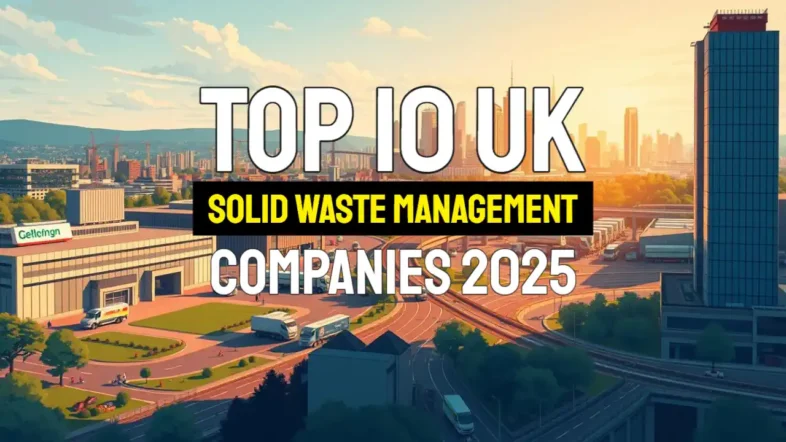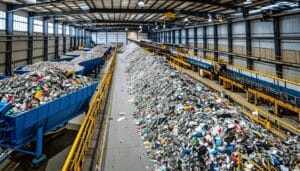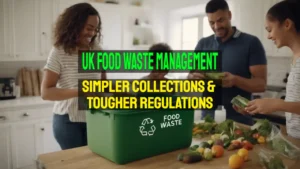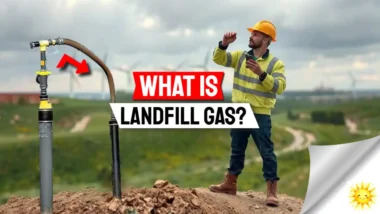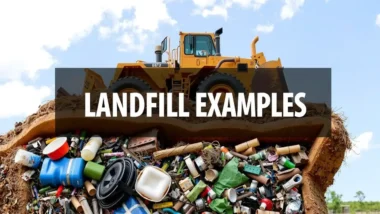The UK waste management sector stands as a vital industry worth billions of pounds. The top UK Solid Waste Management Companies are the leading waste management firms in Britain. These companies handle millions of tonnes of rubbish each year.
The industry has transformed significantly over the past two decades through strategic mergers and environmental innovations. Read on to find out more about them…
Major uk solid waste management companies generate substantial revenues whilst serving millions of households and businesses. Veolia Environmental Services dominates the market with annual revenues exceeding £3.3 billion. The company operates across 35 countries and employs 78,000 people worldwide.
Biffa Group ranks second amongst waste disposal services uk providers with £1.4 billion in revenue. The company collects rubbish from 2.5 million homes each week. This involves emptying more than 4 million bins across Britain.
The sector encompasses various specialised services including recycling operations and waste-to-energy facilities. Companies like Suez Environnement UK and FCC Environment have emerged through major business transformations. These changes reflect the industry's evolution towards more sustainable practices.
Key Takeaways
- The top five waste management companies generated £4.8 billion in combined revenue during 2019/2020
- Veolia Environmental Services leads the market with £3.3 billion annual revenue
- Biffa Group services 2.5 million British homes weekly
- Major companies have undergone significant rebranding and mergers since 2000
- The sector includes specialised services from recycling to hazardous waste disposal
- Leading firms employ thousands of workers across multiple countries
Overview of the UK Solid Waste Management Industry
The UK solid waste management industry stands as a vital pillar of the nation's infrastructure, transforming waste into valuable resources whilst protecting our environment. With growing urbanisation and stricter environmental standards, the sector continues to evolve rapidly. The industry now focuses on innovative approaches that balance economic growth with ecological responsibility.
Market Size and Revenue Statistics
The UK waste management sector generates substantial economic value through its comprehensive operations. Twenty major companies dominate the market, collectively managing millions of tonnes of waste annually. These recycling firms britain have established extensive networks across the country, serving both residential and commercial sectors.
| Company | Annual Revenue (£ Million) | Market Share (%) |
|---|---|---|
| Veolia | 3,308 | 41.4% |
| Biffa | 1,443 | 18.0% |
| Suez | 713 | 8.9% |
| Viridor | 648 | 8.1% |
| FCC Environment | 508 | 6.4% |
| Others | 1,380 | 17.2% |
Environmental Impact and Sustainability Goals
Modern waste management companies prioritise sustainable waste solutions through circular economy principles. These organisations convert waste materials into renewable energy and recycled products, significantly reducing landfill dependency. The sector employs hundreds of thousands of workers across collection, treatment, and recycling facilities.
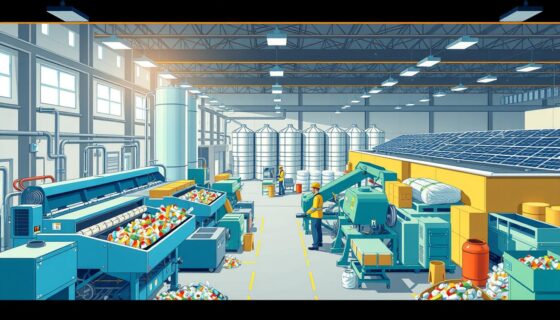
Industry leaders have committed to achieving net zero emissions targets by 2050. This ambitious goal requires substantial investment in new technologies and infrastructure upgrades across the nation.
Regulatory Framework and Compliance Requirements
The Environmental Protection Act 1990 forms the foundation of environmental compliance uk standards for waste management. Companies must navigate complex regulations whilst maintaining operational efficiency. Rising landfill tax rates, set to increase by 22% in April 2025, push organisations towards more sustainable practices.
New UK Emissions Trading Scheme regulations will soon apply charges to waste incinerators, further shaping industry practices. These evolving requirements ensure that waste management companies continuously improve their environmental performance whilst serving communities across Britain.
Leading UK Solid Waste Management Companies by Revenue
The UK's waste management sector is dominated by several major waste management operators that have established themselves as industry leaders through extensive infrastructure and comprehensive services. These companies handle millions of tonnes of waste annually, operating sophisticated waste treatment facilities across the nation. Their combined efforts shape the landscape of commercial waste collection and environmental stewardship in Britain.
Veolia Environmental Services – £3,308 Million Revenue
Veolia Environmental Services stands as the undisputed leader in the UK waste management industry. With annual revenue of £3,308 million, this global powerhouse operates across 35 countries and generates €24.8 billion worldwide. The company's UK operations encompass everything from household collections to industrial waste processing, making it an essential provider of commercial waste collection services for businesses of all sizes.
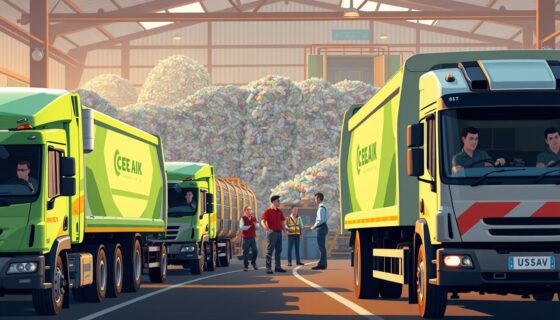
Biffa Group – £1,443 Million Revenue
Based in High Wycombe, Biffa Group serves 2.5 million households and collects an impressive 4 million bins weekly. With revenue of £1,443 million, Biffa has built its reputation on reliable service and innovative waste treatment facilities. The company provides integrated solutions that span collection, recycling, and disposal services for both residential and commercial clients.
Suez Environnement UK – £713 Million Revenue
Suez Environnement UK operates over 40 brands across 70 countries, generating £713 million in UK revenue. The company specialises in converting waste into valuable resources, including biogas and recycled materials. Their advanced processing capabilities demonstrate the evolution of modern waste management beyond simple disposal.
Viridor (Pennon Group) – £648 Million Revenue
Acquired by Pennon Group in 1993 for £1.5 billion, Viridor earns £648 million annually through its focus on energy recovery and recycling. The company operates some of the UK's most advanced waste treatment facilities, transforming waste into renewable energy whilst maximising material recovery rates.
Mid-Tier Waste Management Organisations
Beyond the industry giants, several mid-tier players provide essential waste management services across Britain. These companies combine specialised expertise with regional coverage, contributing significantly to the UK's waste infrastructure. Each organisation brings unique strengths to the market, from construction waste expertise to innovative recycling technologies.
Mick George Ltd – £277 Million Revenue
Mick George Ltd stands as one of Britain's most established landfill management organisations, with over four decades of operational experience. The company delivers comprehensive waste solutions including skip hire, demolition services, and aggregate supply. Their integrated approach covers both collection and processing, making them a key player in regional waste management.
DS Smith Recycling UK – £265 Million Revenue
DS Smith Recycling UK specialises in closed-loop recycling systems, particularly for paper and cardboard materials. As one of the leading recycling services UK providers, they transform collected materials back into usable products. Their focus on circular economy principles helps businesses reduce waste disposal costs whilst meeting environmental targets.

Reconomy – £222 Million Revenue
Founded in the early 1990s, Reconomy revolutionises waste management through data-driven technology. The company serves construction, commercial, and industrial sectors with smart tracking systems for waste compliance. Their digital platform helps clients monitor waste streams and optimise disposal routes across British waste treatment facilities.
Renewi (Shanks Group) – £166 Million Revenue
Renewi operates advanced recycling plants that convert waste materials into valuable resources. Their waste-to-product approach transforms refuse into secondary raw materials, supporting sustainable manufacturing. The company's innovative processing methods reduce reliance on virgin materials whilst diverting waste from traditional disposal sites.
Specialised Waste Treatment Facilities
The UK's waste management sector includes numerous specialised recycling facilities that handle complex materials requiring expert treatment. These facilities play a crucial role in managing dangerous substances and converting waste into valuable resources.
Among the leading hazardous waste disposal companies, SRCL (now part of Stericycle) generates £102 million in annual revenue through medical waste management services. The company specialises in treating clinical waste from hospitals, laboratories, and healthcare facilities across Britain. Tradebe Environmental Services, with £126 million in revenue, operates multiple treatment centres for hazardous industrial waste throughout the UK.
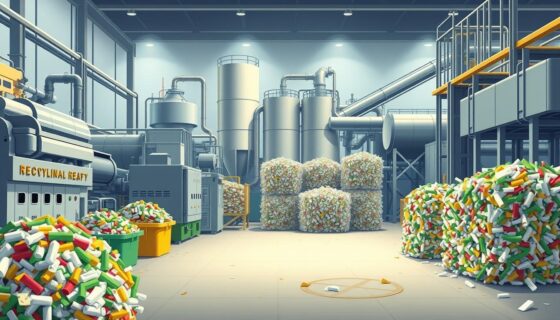
Waste-to-energy providers UK contribute significantly to sustainable waste management. Cory Riverside Energy, earning £118 million annually, operates advanced facilities that transform household rubbish into electricity. Their plants process thousands of tonnes of waste yearly, powering homes whilst reducing landfill dependency.
| Company | Annual Revenue | Specialisation |
|---|---|---|
| SRCL/Stericycle | £102 million | Medical waste treatment |
| Tradebe Environmental Services | £126 million | Hazardous industrial waste |
| Cory Riverside Energy | £118 million | Waste-to-energy conversion |
| Perma-Fix UK | Not disclosed | Nuclear waste management |
Perma-Fix UK represents the pinnacle of specialised waste treatment technology. Their advanced systems include automated radiological characterisation equipment and high-temperature processing units achieving remarkable volume reduction. The company's hydrolytic chemical destruction technology destroys PFAS substances with 99.9999% efficiency, addressing one of today's most challenging environmental concerns.
Evolution and Historical Development
The UK waste management sector has undergone significant transformation over the past two decades. Major uk waste management mergers have reshaped the industry landscape, creating larger, more efficient operations. These strategic moves have driven innovation and improved environmental standards across Britain.
Major Mergers and Acquisitions Since 2000
The new millennium marked a period of intense waste industry consolidation. Waste Recycling Group made headlines by purchasing Hanson Waste Management for £185 million in 2000. This deal set the stage for larger transactions. Terra Firma Capital Partners recognised the sector's potential, acquiring Waste Recycling Group for £315.2 million in 2003. The most substantial transaction came in 2006 when FCC Environment purchased Waste Recycling Group for £1.4 billion.
Viridor pursued an aggressive growth strategy through multiple waste company acquisitions. The firm acquired Churngold's waste business in 2003, Thames Waste Management in 2004, and Somerset LAWDC Wyvern Waste in 2006. Each purchase strengthened Viridor's regional presence and service capabilities.
Company Name Changes and Rebranding
Several major players underwent significant rebranding to reflect their evolving identities. SITA UK transformed into Suez Environnement UK in March 2015, aligning with its French parent company. FCC Environment emerged in 2012 from the merger of FOCSA SERVICES and Waste Recycling Group. When Cleanaway joined forces with Veolia, it elevated Veolia's market position substantially.
Market Consolidation Trends
Strategic partnerships and buyouts continue to drive sector efficiency. Smaller regional operators increasingly merge with national providers, creating comprehensive waste management networks. This consolidation improves recycling rates, reduces operational costs, and enhances environmental compliance across the UK.
Waste-to-Energy Providers and Innovation
The UK's waste management sector is transforming through cutting-edge technologies that convert rubbish into power. Major companies are investing heavily in facilities that turn household and commercial waste into electricity, helping Britain meet its renewable energy targets whilst reducing landfill dependency.
Cory Riverside Energy stands at the forefront of waste-to-energy UK operations, generating £118 million in revenue through its Thames-side facility. This plant processes London's residual waste, producing enough electricity to power 160,000 homes annually. Viridor operates multiple energy recovery facilities across the country, combining recycling services with power generation to maximise resource efficiency.
Veolia leads in implementing renewable energy from waste projects that significantly reduce carbon emissions. Their facilities use advanced thermal treatment to extract maximum energy from non-recyclable materials. Grundon Waste Management, with £118 million in annual revenue, operates state-of-the-art energy-from-waste plants in Oxfordshire and Berkshire.
Enovert focuses on extracting energy from landfill sites, generating £112 million yearly whilst capturing methane for power generation. These innovative waste solutions include:
- Anaerobic digestion systems converting food waste into biogas
- Advanced thermal treatment technologies
- Gasification processes producing synthetic fuels
- Combined heat and power systems for local communities
Investment in cleantech initiatives continues growing as companies develop new methods for extracting energy from waste streams. These technologies support Britain's renewable electricity goals whilst addressing the mounting waste crisis facing urban areas.
Commercial Waste Collection Services
The UK's waste management sector provides essential services across residential, commercial, and industrial operations. From household bins to specialist hazardous material handling, these companies ensure proper disposal and recycling throughout Britain. Understanding the different service categories helps businesses and councils select appropriate waste management partners.
Municipal Waste Management
Municipal waste management UK operations form the backbone of public cleanling services. Biffa leads the sector, collecting rubbish from 2.5 million households each week. Serco Waste Management delivers integrated solutions with annual revenues reaching £160 million. These companies work closely with local authorities to maintain regular collection schedules and meet recycling targets set by government regulations.
Industrial and Hazardous Waste Disposal
Specialist firms handle industrial waste disposal requirements for factories, hospitals, and chemical plants. Tradebe Environmental Services manages complex waste streams with £126 million in revenue. SRCL, now part of Stericycle, processes medical waste safely, generating £102 million annually. These companies follow strict protocols to prevent environmental contamination and protect public health.
Recycling and Resource Recovery
Modern recycling transforms waste into valuable resources. DS Smith specialises in paper and cardboard recycling through closed-loop systems. Palm Recycling achieved £85 million revenue in 2020 by processing paper materials. Commercial waste collection services now include electronic waste recycling and plastic processing, supporting Britain's circular economy goals.
| Company | Specialisation | Annual Revenue |
|---|---|---|
| Biffa | Household Collections | £1,443 million |
| Tradebe | Hazardous Waste | £126 million |
| DS Smith | Paper Recycling | £265 million |
| Palm Recycling | Cardboard Processing | £85 million |
Future Outlook and Industry Challenges
The UK solid waste management sector faces transformative changes as stricter environmental policies reshape operations. Companies must navigate complex regulatory landscapes whilst maintaining profitability and service standards. The sustainable waste management future depends on industry adaptation to emerging regulations and environmental responsibilities.
Impact of Rising Landfill Tax
Landfill tax rates will increase by 22% in April 2025, pushing costs to £126.15 per tonne. This substantial rise forces waste management companies to reconsider disposal strategies. Many operators now prioritise recycling infrastructure investments to reduce landfill dependency.
The UK Emissions Trading Scheme expansion includes energy-from-waste facilities, creating additional operational pressures. Incineration charges will affect facility economics, prompting companies to explore alternative treatment methods.
Extended Producer Responsibility Regulations
New packaging waste rules transfer disposal costs to producers, fundamentally changing industry dynamics. UK waste regulations 2025 require manufacturers to fund collection and recycling of their packaging materials. This shift encourages sustainable product design and reduces environmental burden on local authorities.
Net Zero Emissions Targets
Achieving net zero waste targets requires revolutionary operational changes across the sector. Companies invest heavily in renewable energy systems, electric vehicle fleets, and carbon capture technologies.
| Strategy | Implementation Timeline | Estimated Cost Reduction |
|---|---|---|
| Advanced Sorting Technology | 2025-2027 | 15-20% |
| Chemical Recycling Plants | 2026-2030 | 25-30% |
| Renewable Energy Integration | 2025-2028 | 18-22% |
Top UK Solid Waste Management Companies – Conclusion
The UK waste management sector summary reveals a thriving industry worth over £8 billion annually. The top 20 companies continue to shape Britain's approach to waste collection, treatment, and disposal. Market leaders Veolia, Biffa, and Suez dominate the landscape with their extensive infrastructure and innovative solutions. These firms process millions of tonnes of waste each year whilst developing new recycling technologies.
Leading waste companies Britain relies on have evolved through strategic mergers and acquisitions over the past two decades. Mid-tier operators including Mick George, DS Smith, and Reconomy fill crucial gaps in specialised waste services. Their combined efforts ensure communities and businesses across the UK receive comprehensive waste management solutions. The sector's consolidation has created stronger, more efficient organisations capable of meeting modern environmental standards.
The waste industry future faces significant challenges and opportunities. Rising landfill taxes push companies towards sustainable alternatives like waste-to-energy facilities and advanced recycling programmes. Extended Producer Responsibility regulations demand new approaches to packaging and product disposal. Net zero emissions targets by 2050 require substantial investment in cleaner technologies and processes.
Britain's waste management sector stands ready to meet these challenges through continued innovation and adaptation. The industry's commitment to environmental protection and resource recovery positions it well for sustainable growth. As regulations tighten and public awareness increases, these companies will play an essential role in creating a circular economy across the United Kingdom.
Top UK Solid Waste Management Companies – FAQ
What are the largest waste disposal services UK companies by revenue?
Which recycling firms Britain specialise in hazardous waste disposal?
What sustainable waste solutions are British waste treatment facilities implementing?
How do landfill management organisations address rising environmental regulations?
Which waste-to-energy providers UK offer commercial waste collection services?
What types of services do mid-tier UK solid waste management companies provide?
How has the UK waste management sector evolved through mergers and acquisitions?
What revenue do British waste treatment facilities generate annually?
Revolutionizing Waste Recovery: Latest Separation And Sorting Innovations
Waste recovery is changing fast, thanks to new separation and sorting technology. This tech helps us sort trash better, so we can recycle more things. For example, Stadler has built a big plant in Spain for VAERSA that makes recycling easier and smarter. Keson is finding new ways to deal with old tyres, helping both […]
Ramp Method of Waste Disposal – Landfill Guide & Techniques
The ramp method optimizes landfill operations by creating an inclined surface, allowing efficient waste compaction and daily cover application. Unlike traditional methods, it requires minimal excavation, reducing costs and extending landfill lifespan. Proper implementation and equipment maintenance are key to effective ramp method performance in various terrains…
The Future of UK Food Waste Management – Simpler Collections and Tougher Regulation
The future of UK food waste management will be a big push toward higher recycling rates through simpler collection and far greater consistency across the nations, helping citizens understand how to be green and recycle more organic waste. As the UK continues to advance its environmental goals, recently announced government policies aimed at simplifying waste […]
Cost of Commercial Waste Disposal UK: Keeping the Numbers Low: What UK Rubbish Really Costs
Managing rubbish costs money. UK companies know this too well, as they deal with heaps of trash every day. Every year, these businesses create 27.5 million tonnes of commercial waste and 13.6 million tonnes of industrial waste – that's a mountain weighing 41.1 million tonnes! Tossing all that waste can eat up to 4-5% of […]
